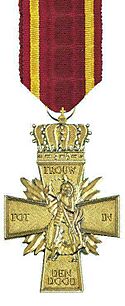Dutch Cross of Resistance facts for kids
Quick facts for kids Dutch Cross of Resistance |
|
|---|---|

The Dutch Cross of Resistance
|
|
| Type | Civil decoration |
| Awarded for | Extreme bravery awarded to the Dutch Resistance |
| Status | No longer awarded |
| Statistics | |
| Established | 3 May 1946 |
| Precedence | |
| Next (higher) | Honorary Sabre |
| Next (lower) | Honorary Medal for Charitable Assistance |
Ribbon bar of the Dutch Cross of Resistance |
|
The Verzetskruis 1940–1945, also known as the Cross of Resistance 1940–1945, is a very special award from the Netherlands. It was created on May 3, 1946. This award was given to people who showed amazing bravery. They stood up against the enemies of the Netherlands and fought to keep their country free. It is considered one of the highest and most important awards in the Netherlands.
Contents
Why the Cross Was Created
Before the Netherlands became free in May 1945, the Dutch government was working from London. They were planning a fair system of awards for both civilians and soldiers. They already had some awards like the Military Order of William. They also made new ones, such as the Bronze Lion and the Bronze Cross.
However, there was no specific award for members of the Dutch Resistance. These brave people secretly fought against the occupation. Other countries had already made special awards for their own resistance fighters. It was decided that the actions of the Resistance needed a unique award. This was because their brave acts were different from typical military actions.
Also, Queen Wilhelmina personally wanted to make sure the Resistance's hard work was recognized. Other countries had also honored the Dutch resistance with awards. These included the British King's Medal for Courage in the Cause of Freedom and the American Medal of Freedom.
What the Cross Looks Like
The Cross of Resistance is made of bronze and sits on a flaming star. A royal crown is placed at the very top. In the middle of the cross, you can see an image of Saint George. He represents the Dutch Resistance. Saint George is shown defeating a dragon, which symbolizes the Nazis.
On the arms of the cross, there is an important message written in Dutch: "TROUW TOT IN DEN DOOD". This means "Loyal to death". On the back of the cross, there is a flaming sword. This sword is shown breaking a chain in two. This symbolizes freedom from oppression.
The cross hangs from a crimson (deep red) ribbon. This ribbon has an orange line along each edge.
Sizes of the Cross
The Cross of Resistance was made in two different sizes.
- One size was 60x36 mm (about 2.3x1.4 inches). This size was given to people who survived and received the award themselves.
- The other size was larger, 80x48 mm (about 3.1x1.8 inches). This larger cross was given to people who received the award after they had passed away. This is called receiving it "posthumously."
Who Received the Cross
The Cross of Resistance has been awarded 95 times in total. Most of these awards, 93 of them, were given to resistance workers who had died.
- 85 of the recipients were Dutch.
- 7 were French.
- 2 were Belgian.
- One award was given to the Monument to the Jews killed during The Holocaust.
Notable People Who Received the Cross
Many brave individuals were honored with the Cross of Resistance. Here are some of them:
- Paul Guermonprez
- Walraven van Hall
- Bernardus IJzerdraat
- Gerrit Kastein
- Helena Kuipers-Rietberg
- Denis Mesritz
- Johannes Post
- Hannie Schaft
- Richard Schoemaker
- Benjamin Marius Telders
- Gerrit van der Veen
- Peggy van Lier
- Mathilde Verspyck
- Pierre Versteegh
- Gabrielle Weidner
See also
 In Spanish: Cruz de la Resistencia (Países Bajos) para niños
In Spanish: Cruz de la Resistencia (Países Bajos) para niños
- Military William Order
- Order of the Netherlands Lion
- Order of Orange Nassau
- Resistance Memorial Cross, a lower level award

